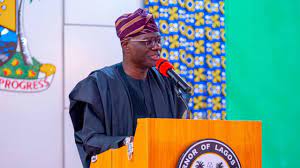Lagos State has established itself as the leading economic hub in Nigeria, generating over 75% of its revenue internally. This impressive feat highlights the state’s strong economic foundation and effective approaches to revenue generation.
According to the latest financial report released by the Lagos State Government, internally generated revenue (IGR) for the fiscal year reached an impressive N500 billion, out of a total revenue of N660 billion. This significant proportion of IGR highlights the effectiveness of Lagos’s economic policies and its diversified revenue streams.
“Lagos State continues to set the pace in revenue generation, thanks to our comprehensive approach to economic management and revenue mobilization,” said Governor Babajide Sanwo-Olu. “Our ability to generate over 75% of our revenue internally reflects the resilience and dynamism of our economy.”
The report attributes the high IGR to several key factors, including improved tax administration, enhanced compliance mechanisms, and the expansion of the state’s tax base. The Lagos State Internal Revenue Service (LIRS) has played a crucial role in this achievement, implementing innovative strategies to boost tax collection and minimize leakages.
One of the notable initiatives includes the deployment of technology in tax collection processes, which has streamlined operations and increased efficiency. Additionally, the state government has undertaken significant efforts to formalize the informal sector, bringing more businesses into the tax net.
The commercial capital of Nigeria, Lagos boasts a diverse economy with thriving sectors such as finance, manufacturing, real estate, and technology. The state’s strategic investments in infrastructure and urban development have also contributed to its strong revenue performance.
“Lagos has a unique economic landscape that supports a high level of internally generated revenue,” said Dr. Yemi Kale, an economist and former head of Nigeria’s National Bureau of Statistics. “The state’s focus on enhancing its business environment and encouraging entrepreneurship has paid off, making it less dependent on federal allocations.”
The high level of IGR has enabled Lagos to undertake ambitious development projects aimed at improving the quality of life for its residents. Key projects include the ongoing construction of the Lagos Rail Mass Transit, extensive road network upgrades, and investments in healthcare and education.
While celebrating the success, Governor Sanwo-Olu emphasized the need for continued efforts to sustain and further enhance revenue generation. “We must remain vigilant and innovative in our approach to revenue mobilization,” he stated. “Our goal is to create a self-sustaining economy that can fund its development needs and provide better services to our people.”
Analysts have praised Lagos’s achievement, noting that it sets a benchmark for other states in Nigeria. “Lagos has demonstrated that with effective governance and strategic planning, states can significantly boost their internally generated revenue,” said Bismarck Rewane, CEO of Financial Derivatives Company. “This is a model that other states should emulate to achieve financial independence and sustainable development.”
As Lagos continues to lead by example, the focus now shifts to maintaining this momentum and addressing challenges such as ensuring equitable tax compliance and managing urbanization pressures. The state’s success in generating a substantial portion of its revenue internally not only highlights its economic strength but also its potential to drive broader national development.
With its robust economic strategies and commitment to innovation, Lagos is well-positioned to continue its trajectory of growth and development, serving as a beacon for economic sustainability in Nigeria and beyond.
